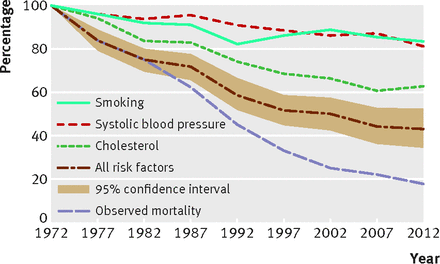The Dangers Of Household Plastics: A Study On Heart Disease Mortality

Table of Contents
The Link Between Household Plastics and Cardiovascular Disease
The connection between household plastics and cardiovascular disease is complex but increasingly evident. Chemicals found in many plastics disrupt the body's delicate hormonal balance and trigger inflammatory responses, both key factors in the development of heart disease.
-
Endocrine disruption: Bisphenol A (BPA) and phthalates are endocrine disruptors, meaning they interfere with the body's hormone system. This disruption can affect various processes crucial for cardiovascular health, potentially leading to increased risk of heart disease, stroke, and other cardiovascular problems. These hormonal imbalances can influence blood pressure, cholesterol levels, and the overall health of your heart.
-
Inflammation: Exposure to certain plastic chemicals can trigger chronic low-grade inflammation throughout the body. Chronic inflammation is a significant contributor to the development and progression of atherosclerosis (hardening of the arteries), a leading cause of heart disease. This inflammatory response damages blood vessels, increasing the risk of blood clots and heart attacks.
-
Lipid profile disruption: Several studies indicate a correlation between exposure to plastic chemicals and unfavorable changes in lipid profiles (cholesterol and triglycerides). Elevated LDL ("bad") cholesterol and low HDL ("good") cholesterol levels are major risk factors for heart disease.
-
Increased blood pressure: Some research suggests a possible link between exposure to certain plastic chemicals and elevated blood pressure (hypertension), another critical risk factor for cardiovascular disease.
Specific Household Plastics of Concern
Many everyday household plastics pose potential cardiovascular risks. It's crucial to understand which plastics to avoid or handle with extra care.
-
BPA in food containers and water bottles: BPA, a chemical used to harden plastics, can leach into food and drinks, especially when heated. Exposure to BPA has been linked to various health problems, including cardiovascular issues. Look for "BPA-free" labeling, but be aware that alternatives may still pose some risks.
-
Phthalates in flexible plastics: Phthalates are found in many flexible plastics, such as cling film, plastic toys, and some food packaging. These chemicals can leach into food and the environment, potentially impacting cardiovascular health.
-
PVC pipes and their potential impact on water quality: Polyvinyl chloride (PVC) pipes are common in plumbing systems. However, PVC can leach harmful chemicals into drinking water, potentially contributing to cardiovascular risks over prolonged exposure.
-
Microplastics in food and water: Microplastics, tiny plastic particles, are ubiquitous in our environment and contaminate food and water sources. The long-term health effects of microplastic ingestion are still being investigated, but studies suggest potential cardiovascular consequences.
Reducing Your Exposure to Harmful Household Plastics
Minimizing your exposure to harmful household plastics is crucial for protecting your cardiovascular health. Here are practical steps you can take:
-
Choosing BPA-free products: Actively seek out products labeled "BPA-free" for food containers and water bottles. While alternatives may exist, it's still a significant step towards minimizing exposure.
-
Opting for glass, stainless steel, and other safer materials: Replace plastic containers and water bottles with glass, stainless steel, or other non-plastic alternatives whenever possible. These materials are generally safer and more durable.
-
Proper food storage techniques: Minimize plastic-to-food contact by using glass or stainless steel containers for leftovers and storing food properly. Avoid wrapping food in plastic wrap when possible.
-
Filtering water: Use a high-quality water filter to remove microplastics and other contaminants from your drinking water.
-
Supporting policies for reducing plastic production: Advocate for stronger regulations on plastic production and waste management to reduce plastic pollution at its source. Support initiatives promoting sustainable alternatives.
The Role of Recycling and Proper Waste Disposal
Responsible recycling and waste disposal are critical components of reducing plastic pollution and minimizing its impact on human health.
-
Understanding plastic recycling codes: Learn to identify recyclable plastics using the recycling symbols. Remember that not all plastics are easily recyclable, and some plastics may require specialized facilities.
-
Proper disposal of non-recyclable plastics: Dispose of non-recyclable plastics according to local guidelines. Avoid simply throwing them in landfills or the environment.
-
Supporting initiatives for plastic waste reduction: Support organizations and businesses focused on plastic waste reduction and the development of eco-friendly alternatives.
Conclusion
The evidence linking household plastics to increased heart disease mortality is compelling. Chemicals such as BPA and phthalates found in many common plastics disrupt hormonal balance, trigger inflammation, and may negatively affect lipid profiles and blood pressure – all contributing factors to cardiovascular disease. By actively reducing your exposure to harmful household plastics, opting for safer alternatives, practicing responsible waste disposal, and supporting policies promoting sustainable materials, you can significantly lower your risk. Make your home safer from harmful plastics and protect your cardiovascular health. Share this information with others to raise awareness and promote healthier living by reducing household plastic risks and minimizing your exposure to household plastics.

Featured Posts
-
 Thlyl Tsryhat Tramb Hwl Aetmad Knda Ela Alwlayat Almthdt
Apr 30, 2025
Thlyl Tsryhat Tramb Hwl Aetmad Knda Ela Alwlayat Almthdt
Apr 30, 2025 -
 Dasmoi Tramp I Ekklisi Toy Galloy Ypoyrgoy Gia Patriotismo Stis Gallikes Epixeiriseis
Apr 30, 2025
Dasmoi Tramp I Ekklisi Toy Galloy Ypoyrgoy Gia Patriotismo Stis Gallikes Epixeiriseis
Apr 30, 2025 -
 Ohio Derailment Investigation Into Long Term Toxic Chemical Contamination In Buildings
Apr 30, 2025
Ohio Derailment Investigation Into Long Term Toxic Chemical Contamination In Buildings
Apr 30, 2025 -
 The Cnils Revised Ai Guidelines Key Changes And Practical Implications
Apr 30, 2025
The Cnils Revised Ai Guidelines Key Changes And Practical Implications
Apr 30, 2025 -
 Disney Cuts 200 Abc News Jobs In Recent Layoffs
Apr 30, 2025
Disney Cuts 200 Abc News Jobs In Recent Layoffs
Apr 30, 2025
Latest Posts
-
 Hunters 32 Point Performance Propels Cavaliers To 50th Win Of The Season
Apr 30, 2025
Hunters 32 Point Performance Propels Cavaliers To 50th Win Of The Season
Apr 30, 2025 -
 Garland Explodes For 32 As Cavaliers Top Blazers In Overtime Thriller
Apr 30, 2025
Garland Explodes For 32 As Cavaliers Top Blazers In Overtime Thriller
Apr 30, 2025 -
 Cavaliers Extend Winning Streak To 10 With De Andre Hunters Strong Performance
Apr 30, 2025
Cavaliers Extend Winning Streak To 10 With De Andre Hunters Strong Performance
Apr 30, 2025 -
 133 129 Ot Victory Cavaliers Defeat Blazers Extend Winning Streak
Apr 30, 2025
133 129 Ot Victory Cavaliers Defeat Blazers Extend Winning Streak
Apr 30, 2025 -
 De Andre Hunter Leads Cavaliers To 10th Straight Victory Over Trail Blazers
Apr 30, 2025
De Andre Hunter Leads Cavaliers To 10th Straight Victory Over Trail Blazers
Apr 30, 2025
